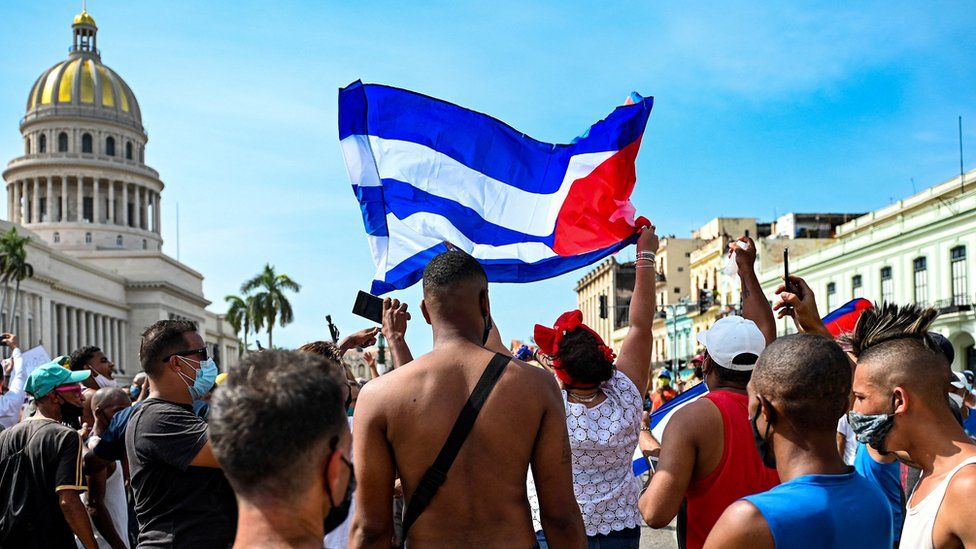Sri Lankan protesters, by their tens of thousands, raided key places of the country's heads on 09 July 2022: the Presidential Palace, the Presidential Secretariat, the official residence of the Prime Minister (the Temple Trees), and his private residence that was razed down in the evening. This forced first Ranil Wickremasinghe, the PM, and later Gotabaya Rajapaksa, the president, to express willingness to resign, albeit not immediately. The island nation is bugged by a severe crisis while the latter's family of thieves prioritised hatred against minorities and left the economy in shambles (read more).
But an interesting thing here is that no one came to save them especially the "president"; not even the security forces who beat even journalists were able to stop the demonstrators. Nor were the ally regimes of the Family-- Vladimir Putin, Narendra Modi, and Xi Jinping-- capable of throwing him a lifesaver. It's mainly because they are also dealing with major challenges: Putin has his war against Ukraine that is humiliating him, Modi is faced by protests and dissent which he has to quell, and Xi is leading his regime in managing COVID-19 lockdowns painful to citizens. Rajapaksa announced an unpopular decision of asking Putin sanction-laden oil from Russia as Sri Lanka is reeling from an empty crude supply, yet people power still ruled and coerced the Sri Lankan despot to concede.
The dictators' survival kit has the following contents: masses' folly and blindness, trust from the military, and foreign support. Lose them all and the ruler will be doomed. First to lose, of course, should be the first one. As in the case of Turkey in 2016, the coup attempt failed because president Recep Tayyip Erdoğan found a way to sqeeze support from the masses and throw the juice of support to his putschists; the attempt only made him fortify his authoritarian rule, although the ongoing economic crisis puts him at risk of losing such popular support, and he has to prove himself for the next year's elections.
The dictator should be able to keep the second if the first is gone. As in the case of Bolivia, albeit the violence from protesters and security forces, then-commander-in-chief of the Armed Forces, Williams Kaiman, in a move disputed as a coup or not, urged then-president Evo Morales to give in to the protesters' demands. Evo gave him no opposition and surrended right after (read more). In certain cases, it is the military that overthrows the leaders, like in the cases of Zimbabwe in 2017 against Robert Mugabe, Sudan in 2019 against Omar al-Bashir, and Guinea in 2021 against Alpha Condé. And even having a divided military is risky: Libya in 2011 had military officers deserting then-leader Muammar Gaddafi, but having a faction loyal to him, the division ended into a civil war.
If the two elements are gone, the dictators have to cling to support from key powers outside the country. All the aforementioned military cases have their foreign backers lacking ability to save them-- PR China blessed the Zimbabwean putschists; al-Bashir's allies only responded after the coup, cooperating with the coup-plotters that are also unpopular to the then-tyrant's civilian oppositors (read more); and Russia and PR China were caught by surprise on the ouster of Condé (read more). Russia and PR China also took no action against resolutions in the United Nations Security Council (UNSC) that reduce Gaddafi's might. In certain cases, foreign powers intervene with little, if ever, resistance from the autocrats' allies, as in the cases of Libya (read more) and the Gambia (read more); though the latter's Yahya Jammeh had no foreign backers.

Protesters marching near Havana's Capitol on 11 July 2021 as they demand the fall of the Cuban Communist regime ruling since 1959. Photo by Getty Images, via BBC News.
What happened in Libya did not happen Syria, despite fury from the masses and a decimated military, as Bashar al-Assad's allies came to the rescue: first Hezbollah and the Iranian regime, then Putin. Assad was then able to retake lost lands, at the cost of the country's resources and tens of thousands of lives.
And what happened in Sri Lanka, Bolivia, Zimbabwe and Sudan also did not happen in countries where regimes have become unpopular: Venezuela's Nicolás Maduro has his security forces, Belarus' Alexander Lukashenko and the Iranian mullahs have their entire systems, and Myanmar's armed forces (Tatmadaw) ousted the democratically-elected government of the Aung San Suu Kyi's National League of Democracy (NLD). All also have foreign backers, although Iran's Velayat-e-Faqih regime tries to stay alive by itself.
And there also are the dissidents in Cuba, now being able to rock the regime after rare massive demonstrations erupted the island last year. The veil of the regime's popularity and a stable economy was torn after, revealing the hardships and poverty the masses are enduring despite repression by security forces. The recent death of the head of the state-run conglomerate GAESA, General Luis Alberto Rodríguez López-Calleja, would also put the regime's economic management in peril and the regime itself at higher risk of popular dissent.
But, again, take note of what I have written earlier: top tyrannical powers from Russia and China are preoccupied by their own problems. If their powerful opponents and the international community continue to exert pressure against them, they would find channeling their resources to the dictatorships they support more difficult. In addition, such systems would scramble to manage their economies, lest they get expelled like the Sri Lankan regime, the first casualty, ends up.
But I am writing these not to give the despots recommendations, but for dear civilians to stand up and seize the opportunity of defeating weakened systems. Should I blame the West for these crises (you know my answer)? It's not about what happened to you, but how you dealt with it.
Article posted on 11 July 2022, 17:40 (UTC +08:00).
No comments:
Post a Comment